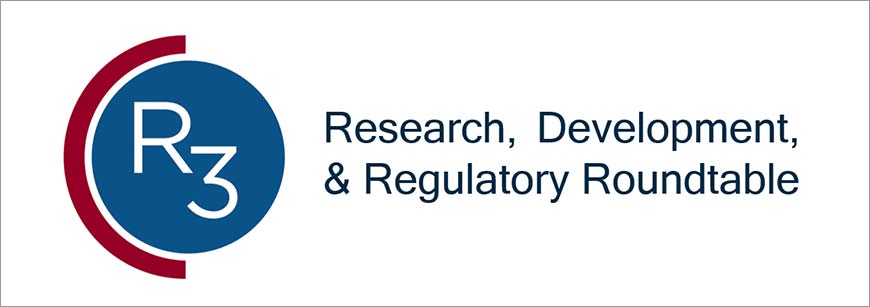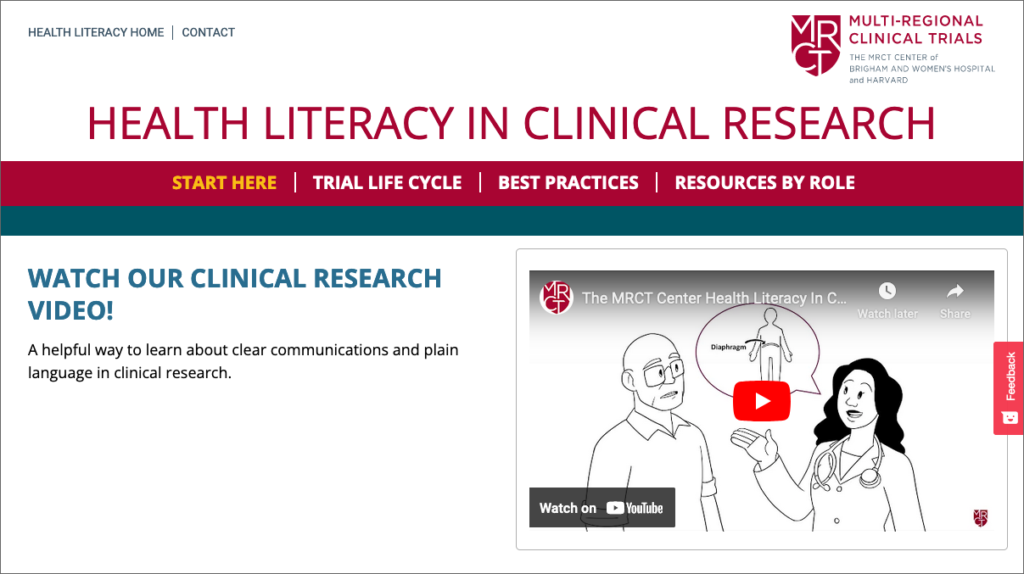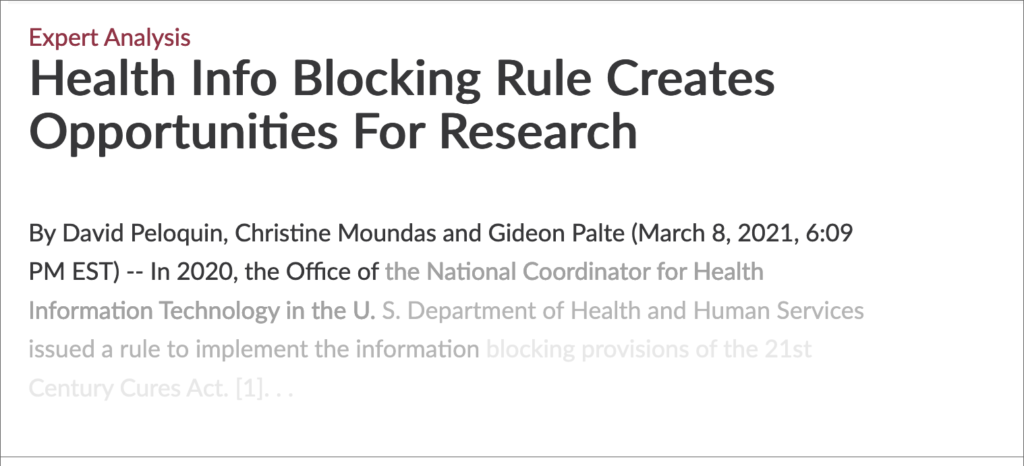Research, Development, & Regulatory Roundtable (R3)
The Research, Development, and Regulatory Roundtable (R3) is a forum to discuss pre-competitive issues in drug and device development, regulatory oversight of clinical trials, and human subjects research. Meetings convene policymakers, legal counsel, academicians, industry representatives, and global regulators. The R3 is a cooperative endeavor coordinated by the MRCT Center and Ropes & Gray LLP.

R3 meetings are open to organizations that sponsor R3. Each R3 meeting focuses on one or two timely discussion topics related to the domestic and global impact of new legislation, regulations, guidance, and policies on research community stakeholders. At the end of each R3 meeting, we will consider whether the topic warrants further discussion or development as a publication, position paper, case study analysis, or commentary. In order to promote open dialogue, the meetings are run by ‘Chatham House Rule,’ by which commentary will not be attributed to any individual nor to their institutional affiliation.
For any questions or interest in sponsoring the R3, please contact us as mrct@bwh.harvard.edu.
Objectives
- Facilitate open and collaborative discussion of non-proprietary issues in research and development
- Promote a deeper understanding of the laws and regulations governing therapeutic innovation, product approval, and the protection of human research participants on the global stage
Project leadership & Staff
- Mark Barnes, JD. LLM. Faculty Co-Director, MRCT Center
- Barbara E. Bierer, MD. Faculty Director, MRCT Center
- David Peloquin, JD. Senior Advisor, MRCT Center
- Sarah White, MPH. Executive Director, MRCT Center
- Julia S. Etkin, MBE Candidate. Research Assistant II, MRCT Center
With appreciation to the following sponsors:
- Advarra
- Alexion Pharmaceuticals
- Amgen
- AstraZeneca
- Bristol Myers Squibb
- Dana-Farber Cancer Institute
- Eli Lilly and Co.
- Gates Foundation
- Gilead Sciences, Inc.
- International Society for Biological and Environmental Repositories
- Johnson & Johnson
- Mayo Clinic
- Merck, known as MSD outside of U.S. and Canada
- PhRMA
- Pfizer
- Sanofi
- Takeda Pharmaceuticals
- Vertex
- WCG
Please contact mrct@bwh.harvard.edu if you are interested in sponsoring the R3.
Meetings
Meeting of The Research, Development, and Regulatory Roundtable (R3)
The Research, Development, and Regulatory Roundtable (R3) is a forum to discuss pre-competitive issues in drug and device development, regulatory oversight of clinical trials, and human subjects research. Meetings convene policymakers, legal counsel, academicians, industry representatives, and global... [See Details]
Meeting of The Research, Development, and Regulatory Roundtable (R3)
The Research, Development, and Regulatory Roundtable (R3) is a forum to discuss pre-competitive issues in drug and device development, regulatory oversight of clinical trials, and human subjects research. Meetings convene policymakers, legal counsel, academicians, industry representatives, and global... [See Details]
The Research, Development, and Regulatory Roundtable (R3) is a forum to discuss pre-competitive issues in drug and device development, regulatory oversight of clinical trials, and human subjects research. Meetings convene policymakers, legal counsel, academicians, industry representatives, and global... [See Details]
The Research, Development, and Regulatory Roundtable (R3) is a forum to discuss pre-competitive issues in drug and device development, regulatory oversight of clinical trials, and human subjects research. Meetings convene policymakers, legal counsel, academicians, industry representatives, and global... [See Details]
The HALT Fentanyl Act, Increasing Medical Marijuana and Cannabidiol Research; Declaration of Taipei
The Research, Development, and Regulatory Roundtable (R3) is a forum to discuss pre-competitive issues in drug and device development, regulatory oversight of clinical trials, and human subjects research. Meetings convene policymakers, legal counsel, academicians, industry representatives, and global... [See Details]
China Revisited: Recent Developments Affecting Research Involving the People’s Republic of China (“PRC”)
The Research, Development, and Regulatory Roundtable (R3) is a forum to discuss pre-competitive issues in drug and device development, regulatory oversight of clinical trials, and human subjects research. Meetings convene policymakers, legal counsel, academicians, industry representatives, and global... [See Details]
The Research, Development, and Regulatory Roundtable (R3) is a forum to discuss pre-competitive issues in drug and device development, regulatory oversight of clinical trials, and human subjects research. Meetings convene policymakers, legal counsel, academicians, industry representatives, and global... [See Details]
The Research, Development, and Regulatory Roundtable (R3) is a forum to discuss pre-competitive issues in drug and device development, regulatory oversight of clinical trials, and human subjects research. Meetings convene policymakers, legal counsel, academicians, industry representatives, and global... [See Details]
Description: The FDA has recently issued several guidance documents as part of the Agency’s ongoing efforts to modernize its policies for the conduct of clinical trials. These include: A final guidance on “Conducting Clinical Trials With... [See Details]
(1) Laboratory Developed Tests; (2) Limitations on Sharing Data with China and Other Countries of Concern
Abstract: Laboratory Developed Tests The scope of FDA’s authority over laboratory-developed tests (“LDTs”) has long been a source of controversy and debate among government and industry stakeholders. In May 2024, FDA issued a final rule that affirms FDA’s position... [See Details]
Meeting of The Research, Development, and Regulatory Roundtable (R3). Meetings are open to R3 Sponsors. To learn more about how to become an R3 Sponsor, click here. Topics: Recent Developments in FDA Guidance on Real World... [See Details]
Expanded Access (Compassionate Use) for Drugs and Devices
Topic: Expanded Access (Compassionate Use) for Drugs and Devices Abstract: The MRCT Center of Brigham and Women’s Hospital and Harvard and Ropes & Gray, LLP are pleased to announce the first meeting of the Research, Development,... [See Details]
Update on the GDPR & Ensuring Integrity of Clinical Trial Data
Topics: 1) Update on the GDPR, including discussion of the EU/US data privacy framework; 2) Considerations for ensuring accurate clinical trials data OPEN TO THE PUBLIC GDPR: This session will involve a panel discussion exploring developments occurring... [See Details]
Topic: Recent Regulatory Developments Affecting Clinical Trials in the EU and UK: EU In Vitro Diagnostics Medical Devices Regulation, EU Clinical Trials Regulation, and EMA Policy 0070 Deliverables Projects [See Details]
Research Collaboration with China: Where are we now with Data Privacy, Export Controls, and Foreign Influence?
Research Collaboration with China: Where are we now with Data Privacy, Export Controls, and Foreign Influence? Deliverables Projects [See Details]
Part 2: Challenges in Decentralized Clinical Trials
Challenges in Decentralized Clinical Trials – Open Discussion Forum Deliverables Projects [See Details]
The Revolution in Online Behavioral Advertising – What it Means for the Research Enterprise Deliverables Projects [See Details]
The provisions of the Food and Drug Omnibus Reform Act of 2022 (“FDORA”) related to advancing diversity, equity, and inclusion in clinical trial enrollment and promoting clinical trial modernization Deliverables Projects [See Details]
An overview of the FDA’s recent final guidance on clinical decision support (“CDS”) software, with a focus on its application to clinical research settings. Deliverables Projects [See Details]
The Impact of International Privacy Laws on Research
In an increasingly connected world, clinical trials and other research activities are no longer state- or country-specific. Not surprisingly, the globalization of research activities creates any number of legal and compliance challenges for stakeholders involved in... [See Details]
Part 2: The Regulation of Research Involving Cannabis
As more states move to legalize marijuana, the regulatory landscape is becoming increasingly complex. The number of sponsors and researchers inquiring about these regulations has also increased. Clinical research involving cannabis is subject to both federal... [See Details]
Part 1: Legal and Regulatory Perspectives on For-Profit Research Sites
The core activities of clinical trials are typically conducted at physical locations referred to as “sites.” Traditionally, these sites are hospitals or academic medical centers. While these traditional sites remain important fixtures in the clinical trial... [See Details]
Recent Developments in the Trans-Atlantic Processing and Shipment of Personal Data for Research Purposes
The European Union (“EU”) General Data Protection Regulation (“GDPR”) and its effect on research activities was the first topic addressed by the R3 at its initial meetings in 2018. In the four years since those meetings,... [See Details]
“Investigator” Designation and “Engagement” Status in Decentralized Clinical Research
Research that is executed in part or in whole through remote modalities, such as telemedicine and health care providers who visit participant homes, is increasingly commonplace yet complicated. Decentralized research raises novel questions regarding whether and... [See Details]
Part 2: Update on the Application of the European Union’s General Data Protection Regulation (GDPR) to Research
In the past 18 months there have been several important developments related to the GDPR, including the Schrems II decision, the resulting European Data Protection Board guidance on cross-border data transfers, and the issuance of revised... [See Details]
In recent years, FDA has increasingly focused on honing its approach to regulating digital health tools and technologies, including those used in the research setting. This presentation focused on the Agency’s risk-based approach to regulation in... [See Details]
Part 2: The Impact of Emerging US State Privacy Laws on Research
Some state privacy laws apply to specific types of data that might be used in research. Other state privacy laws, sometimes referred to as omnibus privacy laws, regulate the collection and use of personal data throughout... [See Details]
Part 1: Legal and Regulatory Challenges with Diagnostic Tests in the United States (US), including Laboratory Developed Tests (LDTs)
Meeting attendees overviewed and discussed the history of LDT regulation, shifting approaches to LDT regulation before and during the COVID-19 pandemic, strategies for navigating LDT regulation, and the relevance of FDA’s investigational device exemption framework to... [See Details]
Part 2: Rethinking the Workforce for Decentralized Clinical Trials: Who is Engaged and Regulatory Requirements
Decentralized clinical trials (DCTs) are clinical trials that are executed in part or in whole through remote modalities, such as telemedicine, smart phone applications, and health care providers who visit participant homes. Vendors engaged in DCTs... [See Details]
Part 1: Direct Interactions Between Sponsors and Research Participants: A Legal Perspective
There has been an increase in sustained interactions between sponsors of clinical research or their designees and potential and enrolled study participants and their families. Sponsor interactions with study participants and their families raise certain legal... [See Details]
Research misconduct allegations may trigger reporting obligations to domestic and international funding agencies, health regulatory authorities, and others. R3 attendees, which included representatives from U.S. funding and regulatory agencies, academia, and biopharmaceutical companies, discussed the challenges... [See Details]
Communication between journals, publishers, and institutions on questions of research misconduct is often lacking due to several reasons, including the speed with which journals seek to resolve these questions and institutional hesitancy to breach the confidentiality... [See Details]
Legal Perspectives on Research Misconduct in Academia and Industry
When an academic institution or life sciences company becomes aware of allegations of research misconduct (i.e., fabrication or falsification of data and/or images, and plagiarism) relating to their researchers, a challenging and time-intensive process of review... [See Details]
Meeting attendees discussed the clinical research regulatory landscape during the COVID-19 pandemic, identifying areas that could be improved upon to foster less burdensome and higher-quality research. Deliverables Projects Meeting Summary Released on: July 7, 2020 Topics:... [See Details]
The second part of the meeting will address the effect on clinical research of fraud and abuse laws, including the Anti-Kickback Statute and the Beneficiary Inducement provisions of the Civil Monetary Penalty Law, as well as... [See Details]
Part 1: Foreign Influence in Clinical Research
The first part of the meeting will address the ongoing National Institutes of Health (NIH) and U.S. Department of Defense (DoD) investigations into foreign influence in American research. The NIH and DoD investigations have focused on... [See Details]
Part 2: Revised Common Rule and Single IRB (sIRB) Questions
Attendees focused on regulatory ambiguities surrounding sIRB usage as research enterprises prepare to transition to full compliance with the Revised Common Rule. Attendees also addressed interpretations of the phrase 'key information' and examined how much authority... [See Details]
Part 1: Regulatory Challenges for Decentralized Clinical Trials
Regulatory Challenges for Decentralized Clinical Trials Decentralized trials promise to modernize the research landscape, optimizing the trial experience for participants, investigators, and sponsors by increasing access to experimental and other therapies and rendering trials more convenient... [See Details]
Part 2: Legal and Ethical Issues in the Enrollment of a Company or Institution’s Own Employees and Students in Research Studies
An increasing number of companies and research institutes wish to enroll their own employees and students in research studies. While employees can serve as a convenient source of potential study participants, enrolling one’s own employees and... [See Details]
China’s new Regulation of Human Genetic Resources (HGR) took effect on July 1, 2019. The regulation closely scrutinizes all HGR-related activity from upstream collection of human biospecimens to downstream exploitation and sharing of the biomaterials and... [See Details]
Secondary Uses of Health Care Data for Clinical Recruitment: Legal and Regulatory Ambiguities
The third Research, Development, and Regulatory Roundtable (R3) was held at the Washington, D.C. offices of Ropes & Gray LLP on March 7, 2019. Stakeholders convened to discuss Secondary Uses of Health Care Data for Clinical... [See Details]
Expanded Access: Practical, Legal, and Regulatory Considerations
Attendees discussed the advantages and drawbacks of the two pathways by which patients may now request access to investigational therapies. Among other things, we considered the impact of each avenue on long-term drug development, the resources... [See Details]
Application of General Data Protection Regulations to Research: Legal, Practical, and Strategic Implications
Convening representatives from academia, industry, and government, this conference explored the impact of the EU GDPR on human subjects research, highlighting the challenges posed by the GDPR to clinical research, biobanking and databanking, and big data... [See Details]




